|
Vermilion Meadow Mouse, Ohio This wonderful leather-tailed Vermilion Meadow Mouse has red faceted glass eyes. These wooden lures were made around 1922 by Frank Knill of Vermilion, Ohio. This small company also made some nondescript spoons and spinners, but this is by far their most collectible of Knill's legacy. |
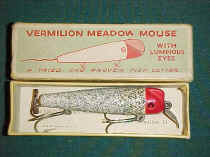 |
|
Weezel Sparrow, Cincinnati, Ohio The Weezel Sparrow lure emerged around 1946 and was marketed by the Weezel Bait Co., which also made an assortment of less appealing lead head jigs. The wooden Weezel Sparrow, according to the literature, was covered in genuine mallard duck feathers and was designed to imitate a fluttering bird on the water. |
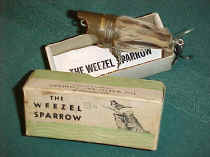 |
|
Weezel Bopper, Ohio The Weezel Sparrow also was made in a featherless version, called the Weezel Bopper. This mint in box Weezel Bopper specimen is in wonderul Frog Spot finish and has introductory papers. Weezel lures are common but fun. |
|
|
Walton Speed Bait, New York This is one of my favorites: the giant musky Walton Speed Bait that holds the distinction of the most propellers ever installed on any lure on the planet. This bait has a total of 24 propellers, each stamped "PAT APL'D" and separated by unique hollow balls of solder. Shown with it for size comparison are the bass sixe with 16 propellers and the tiny flyrod Walton Speed Bait with 12 propellers. |
|
Walton Speed Bait, New YorkThe Walton Speed Bait dates to the late 1920s and was made by Walton Products in New York. It featured tiny propellers inside a well-made cage that spun on retrieve. The black picture box is the one-piece endflap variety. The Walton Speed Bait was made in 3 sizes, including a musky version. |
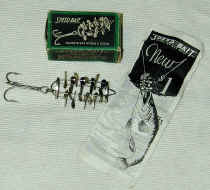 |
|
This patent application for the Walton Speed Bait, dated Jan. 24, 1931, offers some insight into the intricate design created by Charles W. Stickel and William J. Beldue for this unusual lure. The accompanying literature indicates the lure was being made several years earlier, from the mid-1920s, before the patent was ultimately granted on Jan. 19, 1932. Among the patent claims were the unique soldered shafts for the many propellers, the design of the propellers themselves and then angle at which they rotated. Little else is known about the Walton Products Company or its other products, but the talent needed for this sort of device hints at a tool and die operation, or an engineering fabrications company. |
|
|
Weller Classic, Sioux City, Iowa Erwin Weller patented this jointed, glass-eyed lure in 1926. The Weller Classic included a cloth tail that is often missing. The name is stamped on the diving lip, and these baits are found with two or three sections. Wellers are common. |
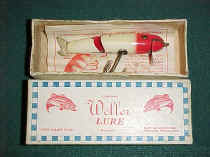 |
Weller Jointed Minnow, Iowa This is one of the earliest Weller boxes, with the "Classic" logo on the top. Note the minty aluminum finished lure inside with the beautiful color papers. This double jointed bait even has hand-painted gills! Some Weller baits had a cloth tail, but this model never came with one and has a pin instead. |
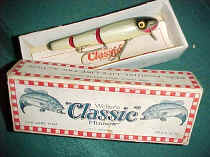 |
|
Weller Ozark Minnow, Iowa This is my favorite Weller. It's an Weller Ozark Minnow, which is almost identical to Heddon's River Runt. This glass eye specimen is lipstick mint in the cleanest box around, complete with color papers introducing this early 1930s lure. |
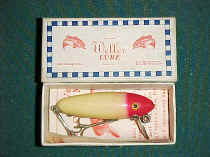 |
|
Weller Mouse, Sioux City, Iowa The Weller Mouse appeared around 1928 and vanished about a decade later. Like other lures by this maker, the bait featured glass eyes and came in a box with a picture of the lure on the front. The flyer calls the Weller Mouse "new." |
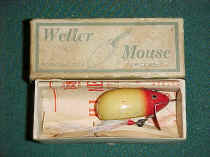 |
Weller Minnow, Iowa This is one of the earliest Weller boxes, with the "Classic" logo on the top. Note the minty aluminum finished lure inside with the beautiful color papers. This double jointed bait even has hand-painted gills! Some Weller baits had a cloth tail, but this model never came with one and has a pin instead. |
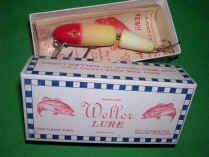 |
|
Weller Big 5 Spoon, Iowa This spoon isn't too exciting, but I'm including it because the box has some graphic appeal, and because you don't see this one often. This big musky or salmon spoon has a huge single hook. The lure is well made and dates to the 1930s. |
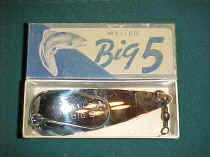 |
Western Game Getter Lures These baits and boxes date to the late 1930s and were sold nationally by the Western Auto Supply Co. as part of an inexpensive line of fishing products. These short-lived boxes are colorful and hard to find. It is likely the tack-eyed wooden lures were made by the Paw Paw Bait Co. of Paw Paw, Michigan. |
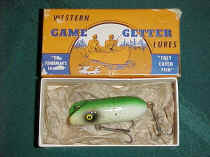 |
Welsherano, Pasadena, Cal. These transparent celluloid lures were marketed by Stewart Welsh of Pasadena sometime in the 1920s. This is a flyrid sized lure, but the larger baits by this maker sometimes featured glass eyes. Most reference books call the lure "Welshereno," but this box shows the true spelling. |
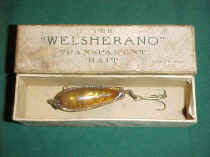 |
|
Whirling Dervish, Oklahoma The Whirling Dervish Bait Company of Tulsa made these plastic or hard rubber lures in the 1940s. For some reason there are jillions of these attractive boxes floating around, but not many lures. This black and red bait was a terror to find. Whirling Dervish baits also came in black and silver. |
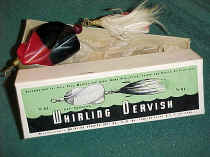 |
|
Wiggly Wriggler, Alliance, Ohio This interesting lure was made around 1930 by the Alliance Manufacturing Company in Alliance, Ohio. The company made an assortment of well-engineered and tooled metal products. This picture box for the Wiggly Wriggler is rare and the Wiggly Wriggler inside is probably in the top 1 percent of metal baits in eye appeal. Wonder if it caught fish? |
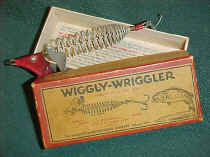 |
Winters Weedless Bait, Illinois This beautiful, hand-painted Winters Weedless Bait was offered briefly by the N.C. Souther Company of Illinois sometime around 1924. The Winters Bass Fly baits are both rare and desirable, and the Winters Weedless Bait boxes are very difficult to find. I'd like to know more about this company and its products. |
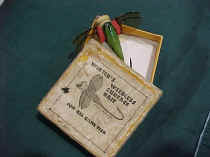 |
Wilson Fish Hawk, Indianapolis The Fish Hawk was made in the 40s by J.R. Wilson of Indiana. The simple wood Fish Hawk lures are wiggle diving plugs. We don't know who J.R. Wilson was, or anything more about his Fish Hawk lures. Indiana was home to many small lure makers, such as Wilson and his Fish Hawk. |
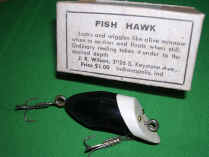 |
|
Worden Spinner Bait Co., Washington This Yakima, Washington, company is unrelated to the famous F.W. Worden of South Bend Bait Co. fame, but is nonetheless an attractive piece from the 1930s. The Worden's Spinning Moth cork lure has leather wings. It's a big box but the Worden's Spinning Moth is a small lure. |
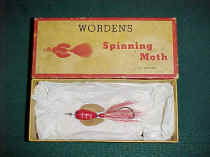 |